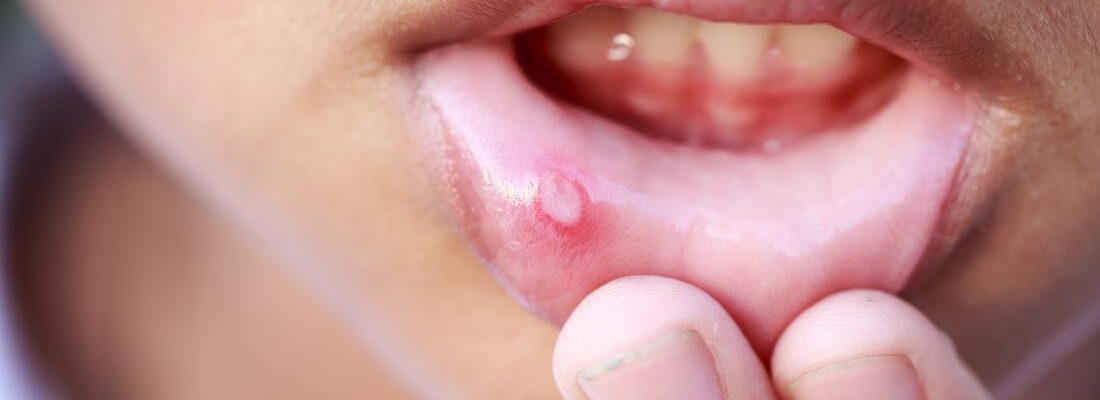Summary
Mouth sores, also known as canker sores or medically as aphthous stomatitis or aphthous ulcers, are small, round sores that form on the inner parts of the mouth, such as the lips, cheeks, or tongue. These sores appear white or yellowish with a red border and are often painful, particularly when eating or drinking. Research shows that approximately 30% of people experience mouth sores at some point in their lives.
Mouth sores usually result from irritation or minor injuries in the mouth. Common causes include accidentally biting the lips, cheeks, or tongue, burns from hot foods or beverages, sharp objects like braces or dentures, aggressive brushing, and smoking. Factors like hot weather, weakened immunity, hormonal changes, and vitamin deficiencies (especially in B vitamins and iron) can also contribute to their occurrence, making some individuals more susceptible to recurrent episodes.
To treat mouth sores, simple home remedies are often effective. Rinsing with saltwater can reduce inflammation, applying baking soda provides soothing relief, and drinking cold water or chewing on ice can numb the affected area temporarily. If these remedies do not provide relief, doctors may prescribe topical ointments, pain relievers, anti-inflammatory drugs, or nutritional supplements to support healing. With proper care, mouth sores usually heal on their own, but persistent or frequent sores may warrant medical evaluation to address any underlying causes.
Table of Contents
Symptoms of Mouth Sores
A person may be experiencing mouth sores if they have the following symptoms:
- Round sores inside the mouth. Small, round sores typically appear on the inner lips, cheeks, or tongue.
- White, painful sores in the mouth. These sores are usually white or yellowish in color with a red border and are sensitive to touch.
- Swelling around the sores. Mouth sores can cause localized swelling, adding to discomfort in the affected area.
- Difficulty drinking, chewing, or speaking. The pain from mouth sores can make it challenging to perform everyday activities like eating, drinking, and talking.
- Fever. While fever is not common in all cases, it may occur if the sores are severe or numerous.
Not everyone with mouth sores will experience a fever; this typically only occurs when the sores are extensive or particularly painful. If fever and widespread sores are present, medical consultation may be necessary to rule out other potential causes or complications.
Types of Mouth Sores
Canker sores, or aphthous ulcers, have three main types:
- Minor canker sores. This type is small, round, or oval and usually heals within 1 to 2 weeks without leaving any scars. Minor canker sores are the most common and are generally less painful than other types.
- Major canker sores. These sores are larger and deeper than minor canker sores, with irregular edges. Healing can take up to 6 weeks, and they often leave scars. Due to their size and depth, major canker sores tend to be more painful and can interfere with eating and speaking.
- Herpetiform canker sores. This type consists of multiple small sores, often appearing in clusters of 10 to 100 tiny ulcers. Despite the name, herpetiform canker sores are not caused by the herpes virus. They can merge into larger, irregular ulcers and are usually quite painful.
Each type of canker sore has its unique healing time and severity level, making accurate identification helpful for appropriate care and treatment.
Diagnostic Procedures for Mouth Sores
Diagnosing mouth sores typically involves a thorough review of symptoms and physical examination by a healthcare provider. While most mouth sores, like canker sores, are harmless and heal on their own, recurrent or severe sores may require further evaluation to rule out underlying health issues. Here are the standard diagnostic procedures for mouth sores:
- Physical examination and symptom review. The healthcare provider begins by visually examining the sores, checking their size, location, color, and distribution. They will also review your medical history, focusing on any recurring sores, allergies, recent injuries, and use of dental appliances, as well as lifestyle factors such as stress or dietary habits.
- Medical history and lifestyle assessment. Because recurrent sores can be linked to immune function, nutrient deficiencies, or lifestyle factors, the provider may inquire about recent stress levels, dietary intake (especially of B vitamins, zinc, and iron), and any history of gastrointestinal or immune disorders like celiac disease or inflammatory bowel disease.
- Blood tests for nutritional deficiencies and immune function. Blood tests may be conducted to check for deficiencies in B vitamins, folic acid, zinc, and iron, as these can contribute to recurring mouth sores. Additionally, blood tests can assess immune function if an autoimmune condition is suspected.
- Allergy testing. If food allergies or sensitivities are suspected as a cause of mouth sores, allergy testing may be recommended. Identifying specific triggers can help in preventing future occurrences of sores.
- Biopsy for persistent or unusual sores. In rare cases, if a mouth sore appears unusually large, does not heal within 2 to 3 weeks, or shows other concerning signs, a biopsy may be performed. This involves taking a small tissue sample from the sore to test for other potential conditions, including oral cancer or infections.
Most mouth sores can be diagnosed with a simple visual exam and medical history review. However, these additional diagnostic procedures can help in identifying underlying issues, guiding effective treatment, and providing relief from recurrent or severe mouth sores.
Complications of Untreated Mouth Sores
While mouth sores, or canker sores, are often minor and heal on their own, untreated or recurring sores can lead to complications, especially when they cause significant discomfort or signal underlying health conditions. Here are some potential complications associated with untreated mouth sores:
- Pain and difficulty eating, drinking, or speaking. Persistent or severe mouth sores can make eating, drinking, and speaking uncomfortable or even painful. This can lead to reduced food intake, dehydration, and, in some cases, unintentional weight loss.
- Secondary infections. Untreated sores can become sites for bacterial infections, especially if they are exposed to further irritation from dental appliances, sharp foods, or poor oral hygiene. A secondary infection can lead to swelling, pus formation, and additional pain in the affected area.
- Nutritional deficiencies. Ongoing mouth pain may lead to avoidance of certain foods, which could result in nutritional deficiencies. People with recurring sores may find it difficult to consume a balanced diet, potentially exacerbating nutrient-related issues, particularly with B vitamins, zinc, and iron.
- Chronic or recurrent sores indicating underlying health issues. Frequent mouth sores may be a sign of a more serious health condition, such as celiac disease, inflammatory bowel disease, or autoimmune disorders like lupus. Left untreated, these conditions can lead to other health complications beyond mouth sores.
- Risk of oral cancer with persistent sores. Although rare, mouth sores that do not heal over several weeks or have unusual characteristics may indicate oral cancer. Early diagnosis and treatment of persistent, atypical sores are crucial for preventing serious health risks.
Most mouth sores heal naturally and are manageable with simple care, but monitoring for complications can prevent more serious issues. If mouth sores are recurrent, unusually painful, or persistent, consulting a healthcare provider is essential to address any underlying concerns and ensure effective management.
Causes of Mouth Sores

Image Source: www.futurity.org
Mouth sores, or canker sores, develop when the delicate tissue lining the mouth is directly damaged or irritated. Here are some of the main causes:
- Accidental injury. Biting the inside of the lips, cheeks, or tongue is a common cause, as this physical trauma damages the mucous lining, creating an ulcer.
- Burns from hot foods or drinks. Consuming excessively hot beverages or foods can cause burns in the mouth, which may develop into canker sores as the tissue heals.
- Sharp dental appliances or objects. Braces, retainers, or dentures can irritate or puncture the lining of the mouth, especially when improperly fitted or when a sharp edge is present, directly causing sores.
- Aggressive brushing or flossing. Brushing or flossing with excessive force can erode or damage the mouth’s delicate lining, leading to the formation of sores.
- Chemical irritation from oral products. Certain ingredients in oral care products, such as sodium lauryl sulfate in some toothpaste and mouthwash, can irritate and erode the soft tissues in the mouth, leading to sores.
- Smoking-related irritation. Smoking exposes the mouth to heat and harsh chemicals, which can directly damage and irritate the mouth lining, resulting in sores.
These causes directly affect the mouth’s tissues and lead to canker sores. Identifying and minimizing these direct irritants can help prevent sores from forming and promote faster healing.
Prevention of Mouth Sores

Image Source: www.inc.com
To help prevent mouth sores, consider the following recommendations:
- Avoid overly spicy, sweet, salty, acidic, and hard foods. These types of foods can irritate the mouth’s lining, increasing the likelihood of developing sores.
- Eat fruits and vegetables rich in vitamins B6, B12, zinc, and folic acid. Nutrient-rich foods support overall oral health and help maintain a strong mouth lining, which reduces the risk of sores.
- Brush 2 to 3 times a day to keep bacteria at bay. Regular brushing helps reduce the buildup of bacteria in the mouth, lowering the chances of irritation and sores.
- Use orthodontic wax to prevent friction from braces, retainers, or dentures. Applying wax to sharp or rough edges on dental appliances minimizes irritation to the mouth’s soft tissues.
- Engage in relaxing activities to manage stress. Stress can weaken the body’s defenses, increasing the likelihood of mouth sores, so finding ways to relax can be beneficial.
Taking these precautions can help reduce the frequency and severity of mouth sores, promoting better oral health and comfort.
Risk Factors for Mouth Sores
Anyone can develop mouth sores or canker sores, but studies show that they are more common among certain groups:
- Young adults. Adolescents and young adults tend to experience mouth sores more frequently, partly due to hormonal changes during these years.
- Women. Research indicates that women are more likely to develop mouth sores, possibly due to hormonal fluctuations related to menstrual cycles, pregnancy, and menopause.
- People with a family history of recurrent mouth sores. Studies suggest a genetic predisposition, meaning those with a family history of frequent mouth sores are more likely to experience them.
- Individuals with food allergies. People with allergies to specific foods may develop mouth sores as a reaction, especially when consuming acidic or allergenic foods.
Young adults are particularly susceptible due to the hormonal shifts typical of this age, and familial patterns indicate that genetics may play a role in one’s susceptibility to mouth sores.
Mouth Sores FAQs
Mouth sores, or canker sores, are common, often painful ulcers that can make eating, drinking, and speaking uncomfortable. While they usually heal on their own, recurrent or severe sores can disrupt daily life and may indicate underlying health issues. Here are some frequently asked questions to help you understand more about mouth sores, their causes, and how to manage them.
- What are mouth sores or canker sores?
Mouth sores, medically known as aphthous ulcers, are small, round or oval sores that form on the soft tissues inside the mouth. They often appear white or yellow with a red border and can be quite painful, particularly when eating or drinking. - What causes mouth sores?
Mouth sores can be triggered by various factors, including accidental injuries (like biting the cheek or tongue), irritation from dental appliances, burns, aggressive brushing, stress, and nutrient deficiencies. Specific ingredients in oral products and certain foods may also cause or worsen them. - Are mouth sores contagious?
No, mouth sores are not contagious. Unlike cold sores, which are caused by the herpes virus, canker sores are not infectious and do not spread from person to person. - Who is most likely to get mouth sores?
Mouth sores are more common in young adults, women, and individuals with a family history of canker sores. They also occur more frequently in those with food allergies or specific health conditions that affect immunity. - How long do mouth sores last?
Most mouth sores heal on their own within 1 to 2 weeks. Minor sores generally heal faster, while larger sores, such as major canker sores, may take up to 6 weeks. - Can certain foods cause or worsen mouth sores?
Yes, foods that are acidic, spicy, salty, or hard can irritate the mouth’s lining and may trigger or worsen sores. Avoiding such foods can help prevent and reduce discomfort. - What can I do to relieve pain from a mouth sore?
To reduce pain, try rinsing with salt water, applying a baking soda paste, chewing on ice, or using over-the-counter numbing gels. Drinking cold water can also provide temporary relief. - When should I see a doctor for a mouth sore?
If a mouth sore is unusually large, lasts more than 2 weeks, recurs frequently, or is accompanied by fever or other severe symptoms, it’s best to consult a healthcare provider to rule out underlying conditions. - Can mouth sores be prevented?
While it’s not always possible to prevent mouth sores, avoiding mouth irritants, managing stress, eating a balanced diet rich in vitamins B6, B12, zinc, and folic acid, and practicing gentle oral hygiene can reduce the risk.


